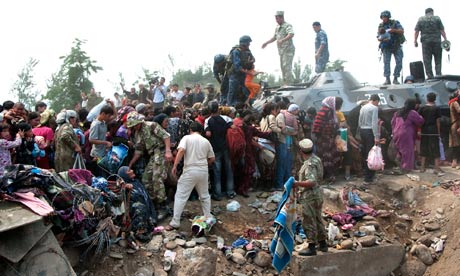Interim leader calls on Russian president to send troops to southern Kyrgyzstan as Osh death toll reaches 65 A desperate Kyrgyzstan today asked Russia to send its army to the south of the country after another day of clashes in the city of Osh, where at least 65 people have been killed and 850 wounded in three days of ethnic rioting. Kyrgyzstan's interim leader, Rosa Otunbayeva, called on Russia's president, Dmitry Medvedev, to intervene militarily. Admitting that her government had lost control of the situation in the volatile south, she said outside forces were needed to restore order. The Kremlin said it had no immediate plans to send troops, describing the riots as an internal conflict. Any prospect of a large-scale Russian military intervention is likely to concern the White House, whose Manas airbase near Kyrgyzstan's capital of Bishkek is a crucial supply post for US forces fighting in nearby Afghanistan. Moscow has its own military airbase near Bishkek. Russian officials said Moscow would consult its regional allies on Monday over what measures it might take. They said Russia – which regards central Asia as its backyard and is keen to limit US influence in the region – would only act in conjunction with the United Nations. Yesterday witnesses described scenes of horror and said thousands of terrified ethnic Uzbeks were fleeing to the nearby border with Uzbekistan. An Associated Press reporter who visited the border witnessed people fleeing in panic and saw bodies of children who had been killed in the stampede. Much of Osh, the country's second biggest city, was today in flames – with Kyrgyz youths carrying out bloody pogroms against Uzbek residents, who are a large minority in the city. Witnesses said Kyrgyz gangs armed with firearms, sticks and metal rods were roaming the streets, burning Uzbek homes and property. The Uzbek cinema, supermarkets and several shops were destroyed. Many residents were hiding in their cellars, food was running out and large parts of the city reported to be without gas and electricity. The interim government has sent troops and armoured vehicles into the city, but they have failed to stop the rampages. "The sky above Osh is black. The army isn't at all in control. We don't know what to do," one resident told Kyrgyzstan's AKIpress news agency. "The authorities in Bishkek simply don't know what's going on here. We're not just talking about looting but total destruction. By the time troops arrive there will be no one left to save." "It's a real war," said Omurbek Suvanaliyev, a leader of the Ata-Zhurt political party that tried to organise local militia, "Everything is burning, and bodies are lying on the streets," Reuters reported Suvanaliyev as saying. He said the warring parties were using armored vehicles in their fighting. Witnesses said the city's bus station was wrecked, and that 30 Uzbeks were massacred and 70 injured in an overnight pogrom in Cheremushi district. Motorists were daubing "KG" in red paint on their vehicles to show they were ethnic Kyrgyz, they said. In contrast, Uzbeks were painting SOS outside their houses. Passengers who flew in to Osh's airport yesterday were trapped there as gunfire was exchanged at an Uzbek village near the airport's ring road. The disturbances are the most serious since April's street revolution ousted Kyrgyzstan's former leader Kurmanbek Bakiyev. The president fled the country after his troops opened fire in Bishkek, killing at least 85 unarmed protesters. He is now in Belarus. His supporters in the south of the country seized several government buildings last month. Analysts said the pro-Bakiyev counter-revolutionary movement in southern Kyrgyzstan had rapidly evolved into a ferocious ethnic conflict. The region was the scene of inter-ethnic rioting in the 1990s during the breakup of the Soviet Union. Some 1000 people were killed when Kyrgyzstan's Uzbek minority tried to gain autonomy and join neighbouring Uzbekistan. The fear now is that ethnic tensions might erupt across the region. Lilit Gevorgyan, an expert with Global Insight, said the territorial dispute "seems to be coming back to life again". "The Osh Uzbeks have found unlikely partners in ousted president Bakiyev's Krygyz supporters who are happy to join forces with any group antagonistic towards the northern revolutionary government in the capital Bishkek." The collapse of the Bakiyev regime had also ignited a fight between rival criminal gangs, Gevorgyan said, with one Uzbek mafia boss in Osh recently shot dead. Opponents of the new government said it had failed to impose political stability, and was letting the country drift towards civil war. "We have our own resources. We have our own armed forces. We don't need to ask the Russians to deal with the situation," Miroslav Niyasov, former head of the country's security council, told the Observer. "Unfortunately our government isn't up to the job." Otunbayeva – Kyrgyzstan's former ambassador in London and a veteran English-speaking diplomat – telephoned Russia's prime minister, Vladimir Putin, last night to discuss the crisis. She admitted today: "The situation in the Osh region has spun out of control. Attempts to establish a dialogue have failed ... We need outside forces to quell confrontation." Russia dominates a security pact of several ex-Soviet nations that includes Kyrgyzstan. Both its obligations under the Collective Security Treaty OrganiSation and its interests in the strategically placed central Asian nation suggest it will be open to Otunbayeva's call for help.Kyrgyzstan calls for Russian help to end ethnic riots

Subscribe to:
Post Comments (Atom)





0 comments:
Post a Comment